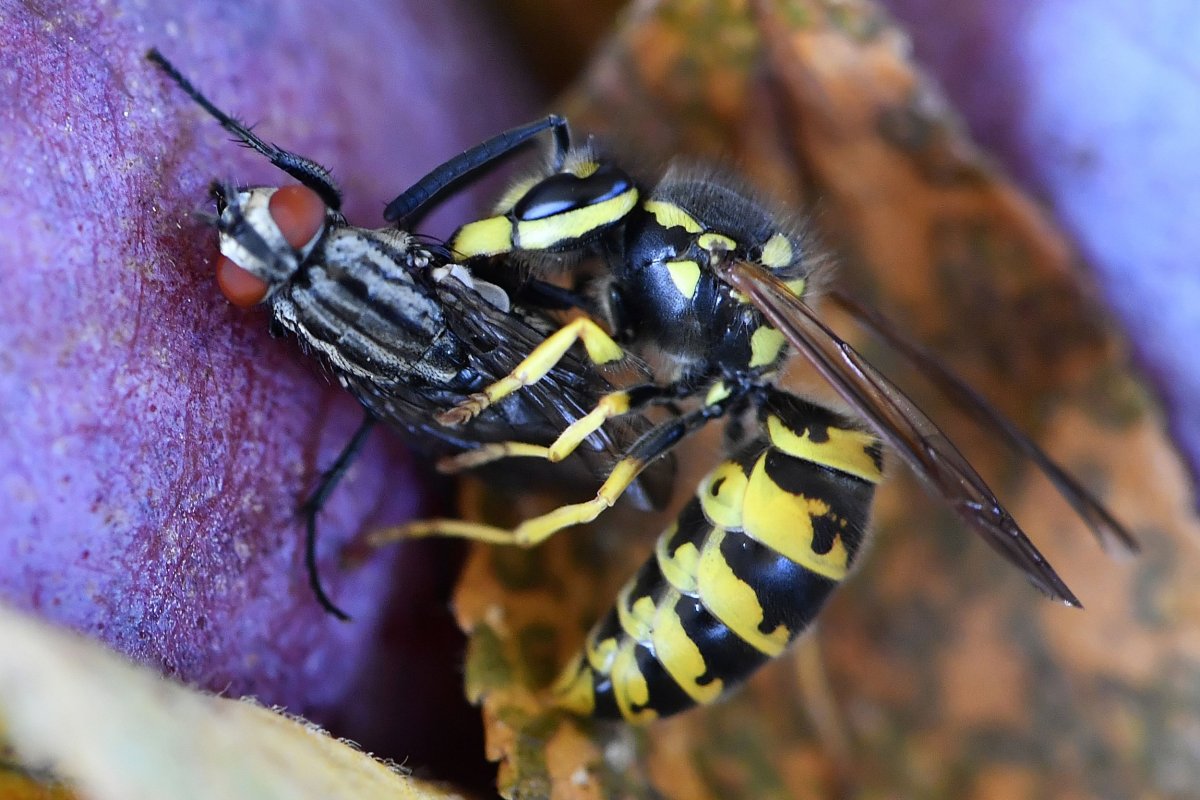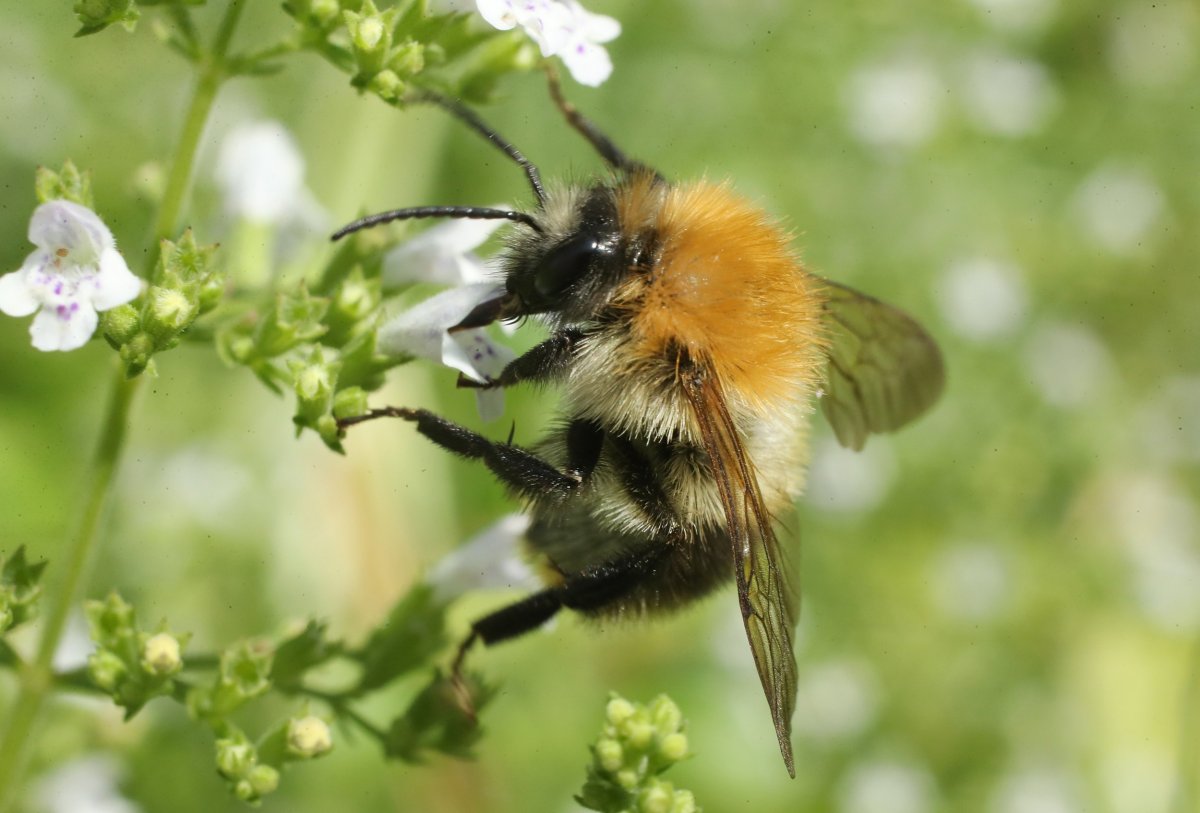Why are bees held in such high-regard, while their wasp cousins seem to be almost universally disliked?
This apparent hate for wasps is, in large part, down to a lack of understanding among the public of the numerous ecological and economic benefits that the insects provide, according to researchers from University College London (UCL).
In a study published in the journal Ecological Entomology, a team led by Seirian Sumner from UCL's Centre for Biodiversity and Environment Research, investigated the public perception of both bees and wasps.
"Although there is a general consensus that people hate wasps, we lacked scientific evidence of this, and the reasons why," she told Newsweek. "So, we put out a survey on social media to find out the truth."
The researchers surveyed 748 members of the public from 46 countries on their perception of insects, including bees and wasps. The results of the survey were clear.
"The public do hate wasps!" Sumner said. "Words used to describe wasps are negative and emotive (e.g. sting, annoying, pain, dangerous), whilst those used to describe bees are positive and functional (e.g. pollinate, honey flowers, buzz)."
Most importantly, they found that people are generally unaware of the crucial services that wasps carry out.
"The reality is they have a very large role to play ecologically because they are predators," Adam Hart, an entomologist from the University of Gloucestershire, U.K., who was not involved in the study, told Newsweek. "So, they're natural pest controllers. They take huge numbers of insect prey off our crops and off our plants."
"But also, by being predators, they increase biodiversity," he said. "If any one organism starts getting too common, it will attract the eye of a predator and pretty soon it gets knocked back again."
Wasps are also involved in pollination, a role that they tend to get ignored for. While they do not pollinate to the same extent as bees, they are more generalist and may act as good backups in degraded habitats where bees are not found, according to Sumner.
"The public do not appreciate the important services provided by wasps, as nature's pest-controllers," Sumner said. "Our study shows that the public rate the value of bees highly as pollinators, but they just don't get it about wasps as predators."

So, why the hate? Unlike bees—which humans have lived in harmony with for a very long time—our only interactions with wasps seem to be unpleasant, as anyone who has ever had their summer picnic ruined will know.
"Of course, they can sting us, which is the case for other insects as well like bumblebees and honeybees," Hart said. "But bumblebees are nice and fluffy and round so everyone thinks they're very cute and honeybees of course make honey, so we tend to forgive them for bothering us, even though they do quite a bit.
"I think the biggest problem with wasps is that they're very recognizable and they tend to be at their most active—and are most numerous—at exactly the same time that we like to be out and about," he said. "So in summer, we're sitting there holding all the things that they like to eat—sweet things and meaty sandwiches, for example—and we end up with this perfect storm of wasp and human behavior overlapping."
Their habit of flying around our heads is also particularly bothersome to many people, but Hart says they are simply trying to navigate.
"They like to build up a map of the area they're flying around," he said. "If we're standing up pontificating with a drink in our hand we're a landmark to them. So, they start flying around us to get their bearings. Then we start wafting at them and of course they defend themselves. It's kind of unfortunate really, I think they're somewhat misunderstood. The old boring advice of 'don't swat at it' is totally true."
The fact that the bothersome species which humans are mostly likely to come into contact with—such as yellowjackets and hornets—represent less than 1 percent of stinging wasps, adds to the sense that wasps have been harshly treated, according to Hart.
"Many of the wasps are solitary and we don't notice them," he said. "The ones that we really think of when we're saying the word 'wasp' are the handful of species that live in colonies—the social wasps. They're the ones that bother us at picnics."
Interestingly, our dislike of wasps could be culturally ingrained and can be traced back far into history, according to the authors of the latest study.
"The culture of wasp-hate goes back thousands of years," Sumner said. "Aristotle—the first published entomologist—described wasps in a negative light compared to bees. Swarms of wasps are seen as punishment by God in three books of the Bible."
This is likely to lead to a positive feedback effect, she said: "Culturally we are brought up to hate and fear wasps; this is likely to influence the chances of scientists choosing to study wasps—as opposed to bees; less research on wasps means less general appreciation and knowledge about their role; less knowledge means less exposure to the public by the media."
In fact, the scientists measured this effect. The number of papers on the ecological importance of bees outnumber those on wasps by 40:1, according to Sumner, meaning much less is being done to communicate their positive role in the ecosystem.
The fact that all insects, including wasps, are under threat from climate change and habitat loss highlights the need to protect the animal and safeguard the benefits they bring to the planet, they say.
"Global concern about the decline of pollinators has resulted in a phenomenal level of public interest in, and support of, bees," co-author of the study, Alessandro Cini from UCL, said in a statement. "It would be fantastic if this could be mirrored for wasps, but it would need a complete cultural shift in attitudes towards wasps."

"The first step on the way to this would be for scientists to appreciate wasps more and provide the required research on their economic and societal value, which will then help the public understand the importance of wasps."
Findings from the new study show that by educating people about nature, this change in perception could be achieved.
"The better understanding we have of the role of wasps as predators, the less we hate them," Sumner said. "People who have a strong interest in nature rate the importance of wasps more highly than those with little interest in nature. We need turn our perceptions of wasps around to positivity and tolerance," she said.
This article has been updated to include additional comments from Adam Hart.
Uncommon Knowledge
Newsweek is committed to challenging conventional wisdom and finding connections in the search for common ground.
Newsweek is committed to challenging conventional wisdom and finding connections in the search for common ground.
About the writer
Aristos is a Newsweek science reporter with the London, U.K., bureau. He reports on science and health topics, including; animal, ... Read more
To read how Newsweek uses AI as a newsroom tool, Click here.








